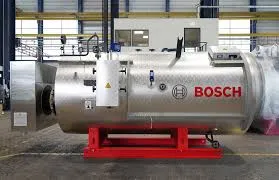
Dec . 20, 2024 17:47 Back to list
boiler thermal oil
Exploring Boiler Thermal Oil Systems Efficiency and Safety
In the realm of industrial heating systems, boiler thermal oil systems have gained prominence for their efficiency and versatility. These systems utilize thermal oil as a heat transfer medium, offering distinct advantages over traditional steam boilers. This exploration delves into the key aspects of boiler thermal oil systems, including their operation, benefits, applications, and safety considerations.
Operation of Thermal Oil Boilers
Thermal oil boilers operate by heating oil to high temperatures, usually between 300°C and 400°C, without the risk of boiling. The thermal oil, which can be a synthetic or organic compound, circulates through a closed-loop system, transferring heat to various industrial processes or spaces. The heating elements, typically heated by gas, electricity, or biomass, warm the thermal fluid, which then delivers the required heat to production units or heating coils.
One major advantage of thermal oil systems is their ability to maintain a constant temperature, providing stable heat transfer across various applications. This feature is particularly beneficial for processes requiring precise temperature control, such as in the food industry, pharmaceuticals, and chemical processing.
Benefits of Using Thermal Oil
1. High Efficiency Thermal oil systems maximize energy efficiency. The use of direct heat transfer avoids the heat loss associated with steam systems, making thermal oil boilers an energy-efficient alternative. Furthermore, they can achieve high thermal efficiencies of up to 90% under optimal conditions.
2. Temperature Control These systems provide excellent temperature control, allowing for a wide range of heating applications. The ability to operate at high temperatures without pressure gives thermal oil systems an edge over traditional steam boilers, making them suitable for processes like drying, curing, and heating viscous materials.
3. Versatility Thermal oil can be used across various industries, including food processing, plastics manufacturing, and wood drying. Its adaptability makes it a preferred choice for enterprises requiring specific heating solutions tailored to their operations.
4. Low Maintenance Thermal oil systems typically require lower maintenance compared to steam boilers. The closed-loop design minimizes the need for water treatment and reduces the risk of corrosion, leading to a longer lifespan and reduced operational costs.
Applications Across Industries
boiler thermal oil

The applications of thermal oil boilers are diverse. In the food industry, they are used for frying, baking, and drying processes, where controlled temperatures are crucial. Chemical manufacturing utilizes thermal oil systems for processes involving high temperatures, such as polymer production and thermal cracking. Additionally, in the textile industry, they play a critical role in dyeing and finishing processes.
The versatility extends to renewable energy applications. Thermal oil is increasingly used in concentrated solar power (CSP) systems, where it transfers heat collected from solar panels to produce steam or electricity, contributing to sustainable energy solutions.
Safety Considerations
While boiler thermal oil systems have significant advantages, operators must prioritize safety. The non-pressurized nature of thermal oil systems minimizes explosion risks, but they still require careful handling and operation. Key safety measures include
1. Regular Inspections Routine checks of the system components, including pumps, valves, and heat exchangers, ensure optimal performance and early detection of potential issues.
2. Thermal Fluid Management Monitoring the thermal oil for contamination is crucial, as degraded oil can lead to inefficiency and increased fire risks. Regular oil testing and replacement schedules should be implemented.
3. Emergency Protocols Establishing comprehensive emergency protocols is vital. Staff should be trained to respond effectively to any incidents, such as leaks or overheating, to ensure the safety of personnel and equipment.
4. Quality Control Investing in high-quality thermal oil and ensuring it is compatible with the system will help maintain safety and efficiency.
Conclusion
Boiler thermal oil systems offer an efficient and reliable solution for various industrial heating applications. Their high efficiency, excellent temperature control, and versatility make them an attractive choice over traditional steam boilers. However, the successful operation of these systems hinges on a commitment to safety and maintenance. By understanding the operation, benefits, applications, and safety considerations, industries can harness the full potential of thermal oil boilers while ensuring a safe working environment. As industries continue to seek energy-efficient and reliable heating solutions, thermal oil systems are likely to remain a cornerstone of modern industrial processes.
-
High-Efficiency Commercial Oil Fired Steam Boiler for Industry
NewsJul.30,2025
-
High-Efficiency Biomass Fired Thermal Oil Boiler Solutions
NewsJul.30,2025
-
High Efficiency Gas Fired Thermal Oil Boiler for Industrial Heating
NewsJul.29,2025
-
High-Efficiency Gas Fired Hot Water Boiler for Sale – Reliable & Affordable
NewsJul.29,2025
-
High Efficiency Biomass Fired Hot Water Boiler for Industrial and Commercial Use
NewsJul.29,2025
-
High-Efficiency Biomass Fired Hot Water Boiler for Industrial Use
NewsJul.28,2025
Related PRODUCTS






















